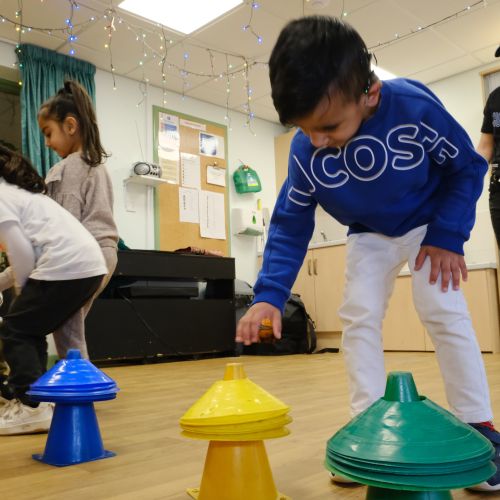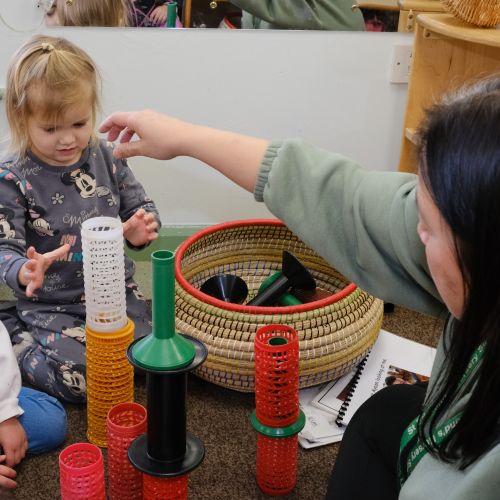Blog
Mindful Maths: Nurturing Childminders with Jacqui Lewis
My experiences across early education, has consistently sought to respect, protect, and celebrate our wonderfully diverse early educators, aiming to empower reflexivity and growth. Through roles including LA Officer, Ofsted Inspector, Early Childhood Lecturer, Area SENco, Early Years Lead, Makaton Tutor, and Early Education Associate, I have supported Childminders from registration to inspection and reinspection.
This blog does not provide a selection of mathematical activities, to pick up and reproduce in your home, although I understand the appeal. This blog centralises you as childminders supporting children’s mathematical thinking, with an emphasis on the importance of attitudes to maths and the impact upon your teaching and children’s learning. A point of reflection where you can pause and consider, what next, what might you need to know and understand to move your mathematical provision forward.

Maths is everywhere!

Children and mathematical development.
I often hear phrases such as ‘I hate maths’, ‘I am not confident with maths’, ‘I don’t know how to do maths with children’, ‘It feels like such a formal part of the curriculum’ and ‘I just end up bombarding children with questions.’ Of course, these phrases do not encapsulate an entire workforce, yet such phrases hold a historical and significant narrative. Add to this, additional challenges expressed from childminders relating to age variance and perceived limitations within their environments, and an interjecting need to support a cycle of self-efficacy is clear. Although expectations around datafication of
children’s learning has evolved, I often visualised educators’ vulnerability of supporting maths through this system. Learning journeys would often display a disparity between maths and remaining areas where creative celebratory narrative existed. Mathematical progress summaries were also more likely to include statements taken directly from assessment guidance, rather than rich descriptions of children’s learning, serving only, to compound perceptions of an outcome focused subject.
I invite you to reflect on your curricular equitability, how does maths measure up as a specific area? The EYFS (2024) states that ‘Childminders must support children in four specific areas, which help strengthen and develop the three prime areas, igniting children’s curiosity and enthusiasm’. In terms of the following, how does your support for maths weigh up with other specific learning areas.
• Time and value afforded for reflection and evaluation.
• Value of process v outcome.
• Invitations and provocations enticing curiosity.
• Enablement of a love for enquiry.
• Environment Equitability.
• Confident delivery of educational programmes.
• Home learning / conversation.
• Play partnerships.
• Questioning.
Practitioners lower order, knowledge-based questions, focusing on fact recall, amount to 93% of questions asked (Nrich). This questioning, which has capacity to interrupt mathematical play and enquiry is not value matched for example to, Literacy; we do not demand, ‘what letter is that?’ whilst children are immersed in stories. Does this correlate with our own mathematical confidence?
The 2008 Williams Report, contributed significant findings, influencing policy, and contextualising the UK as ‘one of the few advanced nations where it is socially acceptable, fashionable even, to profess an inability to cope with the subject’. Williams citied the EPPE study (Siraj-Blatchford et al 2003) noting the Parent/Carer as the most important educational influence in a child’s early development’, however, concluded that ‘the teacher, even more than the parent, determines learning outcomes in mathematics’ (2008:3). Much of our feelings about maths are attributed to our own early maths teaching, the formality, the trepidation of providing the ‘right answer’. The positive influences too, of nurturing mindsets, where mistakes integral to learning are afforded through meaningful, playful activity. Since the introduction of the Mathematics Anxiety Rating Scale in 1972 (Richardson & Suinn) and the Cockcroft report in 1982, which concluded maths anxiety exists in all social groups and educational projects, there has been much research regarding educators’ feelings about maths and their ability to teach it. Many argue, this above maths ability, is a predictor of children’s progress
(Beilock et al 2010). Equally studies (Wilkins 2008; Ma, 2010) concluded that a teacher’s self- confidence and positive attitude towards maths are important factors in effective teaching. A gender imbalance is also cited regarding the impact of female teachers experiencing math’s anxiety, upon girls’ mathematical achievements (Beilock et al, 2010; Schaeffer et al, 2021; Cosgrove, 2023). Whilst the capacity to evoke change from a mindset is important, an inclusive stance towards neurodiversity acknowledges underpinning factors, such as dyscalculia, affecting 6% of the population (BDA 2019).
Wilding, founder, and director of EY Maths, emphasises we cannot seek the ‘what’ of maths without understanding the ‘how’. If we simply seek out the activities that support mathematical development, we will always need to do so. But by developing our own knowledge and understanding of how children learn maths, we will be able to apply this directly in children’s play
and their everyday to support a deeper understanding, fluency, and mastery. Using spirals, the Education Endowment Foundation, provides an insight into how children develop mathematical skills, and concepts over time, using a series of spirals, acknowledging development is not always linear. EEF Evidence Store
Children meet an abundance of mathematical concepts in their early years and although complexity occurs over time, children explore; number, height, weight, depth, positioning, sorting, length, estimation, ordering, spatial reasoning, ordering, measuring, comparisons, counting, pattern, shape, distance, prediction time, speed, calculation etc. Childminders offer a unique provision for mathematical development. The potential learning opportunities through responsive and spontaneous real-life and outdoor experiences, the often-low ratio adult attention with a consistent attachment figure, and peer-to-peer learning within a mixed age cohort.
Maths is everywhere, in every part of the routine from arrival to departure, to mealtimes and outings. It is solitary wondering and collaborative cohesion. It lives in the stories we share, our drawings and designs. It materializes in the patterns
we observe and create, in our blankets, cushions, and dens. It blooms in the plants we grow. It stirs within our cooking, magic potions, and pies. It roars in our rhymes and is whirls in our movements. It is sensed in water, sand, loose parts, and clay, and imagined in our role play.
Maths is everywhere from infinity and beyond, simply seek out the knowledge and understanding we need, climb aboard and if relevant, fly in the face of adversity. Having a mindfulness of our own feelings and attitudes towards maths gives us the power to influence outcomes for ourselves and others. ‘We cannot change what we are not aware of, and once we are aware, we cannot help but change’ (Sandberg, 2013).
References
Beilock, S., Gunderson, E., Ramirez, G. Levine, S. (2010) Female teachers' math anxiety affects
girls' math achievement. Journal of Psychological and Cognitive Sciences 2;107(5):1860-3.
British Dyslexic Association 2019 http://www.dyscalculiaassociation.uk/
The Cockcroft Report (1982) Mathematics counts London: Her Majesty's Stationery Office 1982
Cosgrove, F (2024) Game Changer for Social Research: If Maths Anxiety Could Talk/ Do girls report more Mathematics Anxiety (MA) than boys and if so, why? https://www.bera.ac.uk/blog/if-
maths-anxiety-could-talk-what-do-maths-anxious-ex-pupils-want-to-say-to-the-teaching-
profession
Early Years Foundation Stage (EYFS) Statutory framework for Childminders 2024 EYFS 2024
Childminders
Education Endowment Foundation (2024) EEF Evidence Store Early Maths
Ma, L 2010, Knowing and Teaching Elementary Mathematics: Teachers’ Understanding of
Fundamental Mathematics in China and the United States, Taylor and Francis, Abingdon, Oxon.
Nrich https://nrich.maths.org/frontpage
Sandberg, S. (2013) Lean In: Women, Work, and the Will to Lead. Knopf.
Schaeffer, M.W., Rozek, C.S., Maloney, E.A., Berkowitz, T., Levine, S.C. and Beilock, S.L. 2021.
Elementary school teachers' math anxiety and students' math learning: A large-scale replication.
Developmental science, 24(4), p.e13080.
Siraj-Blatchford, I., Sylva, K., Taggart, B., Sammons, P., Melhuish, E. T. and Elliot, K. (2003), The
Effective Provision of Pre-School Education (EPPE) Project: Technical Paper 10 – Intensive Case
Studies of Practice across the Foundation Stage. London: DfES / Institute of Education, University
of London
Suinn, R. (1972). Mathematics Anxiety Rating Scale, MARS. Fort Collins, CO: Rocky Mountain
Behavioural Sciences Institute.
Wilding, K. (2024) Teaching Early Years Maths Made Simple https://www.eymaths.co.uk/
Wilkins, Jesse L M, The relationship among elementary teachers’ content knowledge, attitudes,
beliefs, and practices, Journal of Mathematics Teacher Education, Vol 11, No 2, 2008
Williams, P. (2008) The Independent Review of Mathematics Teaching in Early Years Settings
and Primary Schools. Final Report DCSF Publications. Nottinghamshire
 |
Jacqui Lewis
|
